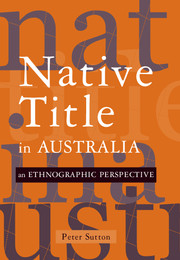Book contents
- Frontmatter
- Contents
- List of Figures
- Acknowledgements
- Introduction
- Map
- Chapter 1 Kinds of Rights in Country
- Chapter 2 Local Organisation Before the Land Claims Era
- Chapter 3 Aboriginal Country Groups
- Chapter 4 Atomism versus Collectivism
- Chapter 5 Underlying and Proximate Customary Titles
- Chapter 6 The System Question
- Chapter 7 Kinship, Filiation and Aboriginal Land Tenure
- Chapter 8 Families of Polity
- Notes
- References
- Index
Chapter 1 - Kinds of Rights in Country
Published online by Cambridge University Press: 22 September 2009
- Frontmatter
- Contents
- List of Figures
- Acknowledgements
- Introduction
- Map
- Chapter 1 Kinds of Rights in Country
- Chapter 2 Local Organisation Before the Land Claims Era
- Chapter 3 Aboriginal Country Groups
- Chapter 4 Atomism versus Collectivism
- Chapter 5 Underlying and Proximate Customary Titles
- Chapter 6 The System Question
- Chapter 7 Kinship, Filiation and Aboriginal Land Tenure
- Chapter 8 Families of Polity
- Notes
- References
- Index
Summary
INTRODUCTION
Native title rights are rights recognised by Australian law, not customary law rights per se. They are attempts to recognise customary rights by translating them into legal terms. Native title is in this sense a ‘recognition space’. The terms of this recognition are those of the Native Title Act of 1993. Native title rights are products of a process in which evidence about indigenous cultural understandings and practices comes under legal scrutiny and is tested, usually by non-indigenous professionals. It is common for that body of information to be presented in the form of written and oral anthropological evidence, or anthropological evidence combined with that obtained directly from those whose native title application is being determined.
This chapter discusses from an anthropological perspective the kinds of rights and interests in country which people hold under Aboriginal traditions. In doing this it is also necessary to address the problem of terminology, as we are confronted with at least the following distinctions in the literature on Aboriginal rights in country:
local individual or family rights versus tribal overrights and rights granted through intertribal territorial comity;
rights versus privileges;
primary versus secondary rights;
unmediated versus mediated rights;
presumptive versus subsidiary rights;
actual versus inchoate versus potential rights;
generic versus specific rights; and, more recently,
core versus contingent rights.
- Type
- Chapter
- Information
- Native Title in AustraliaAn Ethnographic Perspective, pp. 1 - 37Publisher: Cambridge University PressPrint publication year: 2003

